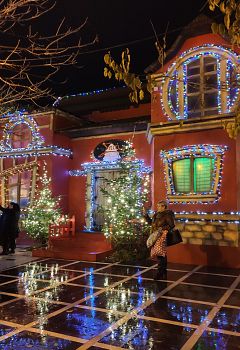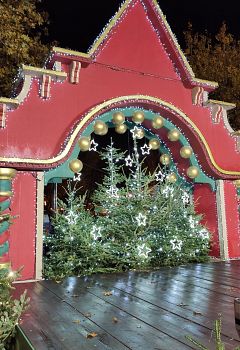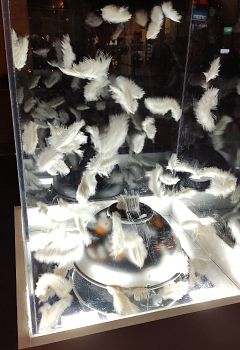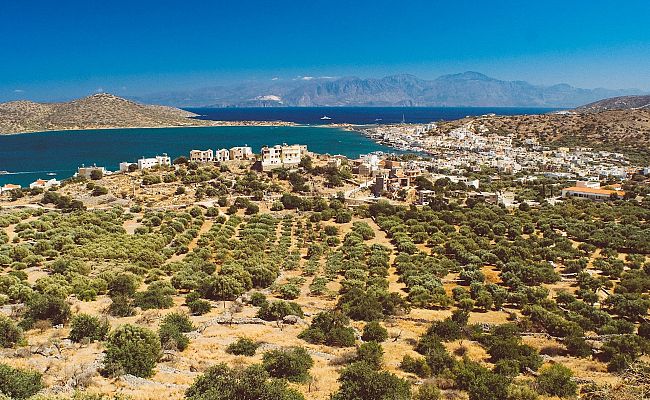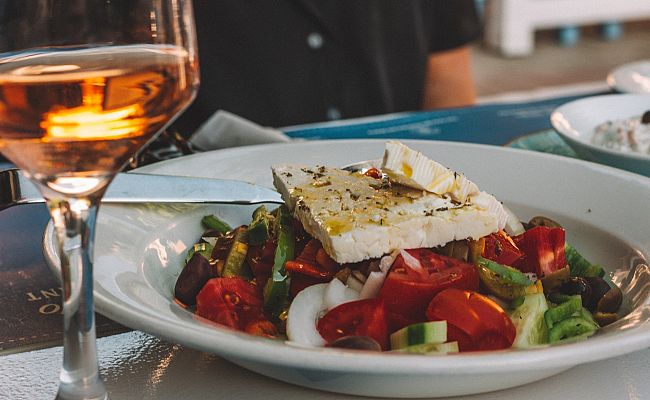New Year's holidays in Greece are the period from December 24 to January 7: Christmas is celebrated on December 25, New Year on January 1 and Epiphany on January 6. On the morning of each of the holidays, children gather in groups and carol. So if you are in Greece on Christmas Day and your doorbell rings at 7 am, don't be surprised.
At night, at 12 o'clock, there is a tradition to light fires to drive away evil spirits - Kalikandzari. These are folklore characters reminiscent of goblins. All year they live underground and envy people, and on Christmas holidays they get upstairs to do petty dirty tricks. Therefore, these days you need to be vigilant and scare them away. Though this tradition with bonfires is observed in the villages, but in big cities they no longer do this. But they also protect themselves from Kalikandzari by other methods: for example, there is a belief that they can get into the house through the chimney, so for all 12 days you need to keep the fire in the fireplace lit.
Greece has its own Santa Claus, whose name is Agios Vasilis. Agios Vasilis is a real person who lived in the 4th century and became famous for devoting most of his life to helping others. He is considered the inspiration and the first creator of organized philanthropy. It is believed that the date of his death - January 1, 379 - brings blessings and good luck in the new year. Therefore, in Greece, on New Year's Eve, we are all waiting for Agios Vassilis to bless our house and receive his piece of Vasilopita.
Symbols of the New Year in Greece: a tree or a ship?
Many will be surprised: the traditional symbol of the holidays among the Greeks is not a Christmas tree, but a ship!
This is very symbolic for a maritime country. Even 50 years ago, elegant ships could often be found in Greek homes. Now their place has been taken by the Christmas tree, which has come from the West. Although most often in cities you can see both symbols of Christmas at the same time.
However, Chios, predominantly a naval island, continues to adhere to the old custom of paying homage to its sailors and preserving folk traditions. Every year on New Year's Eve, the custom of New Year's boats is revived. People gather in groups and carefully create imitations of merchant and warships. The size of the ships is up to 5.5 meters! There is a prize for the best ship, but for most the main thing is participation.
Dishes for the New Year in Greece
Long before Christmas, the time for festive sweets begins, and the main ones are melomakArona and kurabiEdes. They look like cookies, but they are cooked in completely different ways. Despite the fact that they can be bought or prepared at any time, it is in December that the general craze for these sweets begins. Eating kurabiedes and melomacarona in unlimited quantities is a popular topic of New Year's jokes :)
The Greek Christmas/New Year's table, of course, should be full of delicious dishes in huge quantities. The main dishes are meat. Here, turkey and pork are fighting for leadership. Roasted turkey is a newer tradition. It was recognized as the main holiday dish because it was considered an unusual poultry and was cooked only on major holidays. However, in small towns and villages, pork is most often cooked. Moreover, in mainland Greece there is a tradition to raise a pig for Christmas. In addition to the main dishes, there are other meat options, as well as all traditional Greek snacks.
One of the oldest traditions, which is about 1.500 years old, is cutting the Vasilopita pie for the New Year. A coin is hidden in the pie, and whoever gets it will be lucky in the new year. By the way, the tradition comes from Agios Vasilis, whom, like Santa Claus, everyone is waiting for on New Year's Eve.
Traditions of different regions of Greece
Interestingly, each region of Greece has its own New Year and Christmas traditions! Here are the most famous of them.
- Feeding the spring in Central Greece. A few hours before dawn, the girls go in complete silence to the local springs to “feed” them. They bring oil, wheat, honey and "give" them to the water. They empty the vessels with “old” water and collect new ones, which will bring good luck and prosperity to the house.
- Momogeri in Northern Greece. People dress up as animals - wolves, goats and others, or dress up in uniforms, or in the costumes of old people. They walk around the villages all holidays and sing New Year's songs, and also wish good luck in the new year to everyone they meet. When two groups meet, they arrange “battles” with each other. This custom came from the Pontic settlers, but its variants are also found in the villages of Kozani and Kastoria, where it is called Ragutsaria.
- Branches in a fireplace in Central Greece. In Thessaly, young girls and boys, returning home from church, place small tree branches next to a lit fireplace, making wishes. Cedar branches for girls and cherries for boys. The branch that lights up first is a good sign for its owner. In particular, it is believed that the one whose branch was burned first will marry/marries first.
- Christopsomo in Crete. Christmas bread is a bread that women prepare with extreme care on Christmas Eve. Its kneading is a special ritual. Expensive ingredients are used such as finely sifted flour, rose water, honey, sesame, cinnamon and cloves. On Christmas Day during dinner, the host takes Christmas bread, crosses it, cuts it and distributes it to all his family and those who are present at the Christmas table. Many compare this process to the sacrament of Holy Communion.
- "Perfume" in Kefalonia (and neighboring islands). On New Year's Eve, residents, full of joy about the new year, take to the streets with bottles of perfume and sprinkle each other, singing "We came with flowers to wish you many more years." On New Year's morning, the municipal orchestra walks around all the houses and sings chants and carols.
- Breaking a pomegranate in the Peloponnese. On New Year's morning, the family goes to church and the head of the family takes a pomegranate with him to the service. Arriving home, he must ring the door - he does not open it himself with a key - and then enter the house first with a pomegranate in his hand. Entering, he throws it on the floor with all his might so that its grains scatter in all directions, while saying “Health, success and joy to us in the New Year, and how many grains are in the pomegranate, we have so much money in the New Year.” Children collect grains and look: if they are ripe and red, it is fortunate. They break pomegranates for the New Year in Greece, not only in the Peloponnese, but also on some islands.
Should I go to Greece for the New Year?
How is New Year celebrated in Greece? Different, but everywhere fun and sincere! If you are thinking about visiting during the holidays, remember that Christmas in Greece is celebrated on December 25th.
Think in advance where you will celebrate. On Christmas Eve, tables are booked in many establishments, and on the 25th, on the contrary, most taverns do not work, because everyone rests at home with their families. As for December 31st, restaurants and taverns are closed until late. But bars and clubs are open, where young people go to celebrate the holiday.

